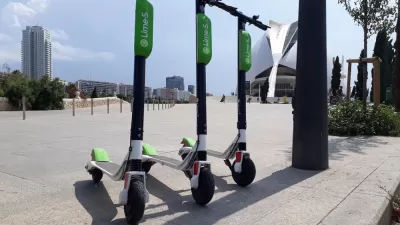Launched in 2009 as an effort to choose five neighborhoods where sustainability measures could be quickly implemented and tested out, the city of Portland's EcoDistricts are entering their pilot phase.
Next American City talks with Portland Mayor Sam Adams about the project and what he hopes it will achieve.
"Next American City: Are the five chosen districts meant to be mixed use? How are you shaping what goes in the districts (retail, residential, etc.)?
Mayor Sam Adams: Portland's standard approach to district-making is to have mixed-income opportunities. Our best work is in housing, and we are now applying the same expectations to affordable, small independent commercial. We are moving forward on triple-bottom-line sustainability, not just for a shallow environmental footprint, but to provide people with economic security and prosperity and make sure that opportunities are equal for all to achieve more social justice and equity. Portland suffers from the same trends, to a lesser extent, as the nation at large in terms of the rich getting richer and the poor getting poorer. Meanwhile, the middle class is challenged like never before. Another focus of social equity is that in Portland, communities of color are in a worse position in terms of economic security when compared with similar communities in Seattle and San Francisco. So we have a lot of work to do. We get high praise for environmental sustainability, but we shouldn't sit on our laurels. We should always do more."
FULL STORY: An Interview with Portland Mayor Sam Adams

Maui's Vacation Rental Debate Turns Ugly
Verbal attacks, misinformation campaigns and fistfights plague a high-stakes debate to convert thousands of vacation rentals into long-term housing.

Planetizen Federal Action Tracker
A weekly monitor of how Trump’s orders and actions are impacting planners and planning in America.

In Urban Planning, AI Prompting Could be the New Design Thinking
Creativity has long been key to great urban design. What if we see AI as our new creative partner?

King County Supportive Housing Program Offers Hope for Unhoused Residents
The county is taking a ‘Housing First’ approach that prioritizes getting people into housing, then offering wraparound supportive services.

Researchers Use AI to Get Clearer Picture of US Housing
Analysts are using artificial intelligence to supercharge their research by allowing them to comb through data faster. Though these AI tools can be error prone, they save time and housing researchers are optimistic about the future.

Making Shared Micromobility More Inclusive
Cities and shared mobility system operators can do more to include people with disabilities in planning and operations, per a new report.
Urban Design for Planners 1: Software Tools
This six-course series explores essential urban design concepts using open source software and equips planners with the tools they need to participate fully in the urban design process.
Planning for Universal Design
Learn the tools for implementing Universal Design in planning regulations.
planning NEXT
Appalachian Highlands Housing Partners
Mpact (founded as Rail~Volution)
City of Camden Redevelopment Agency
City of Astoria
City of Portland
City of Laramie




























